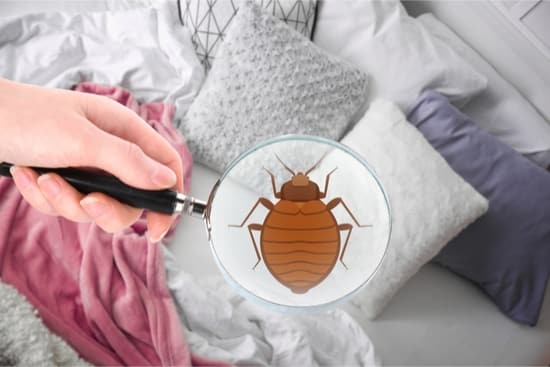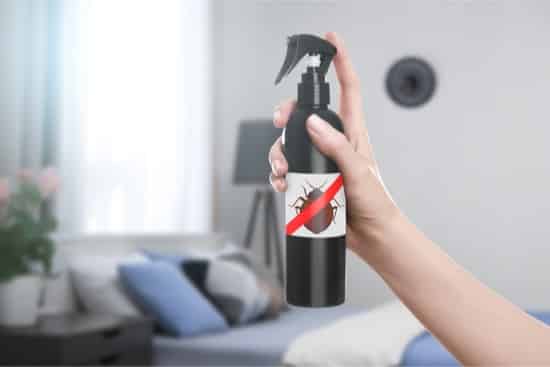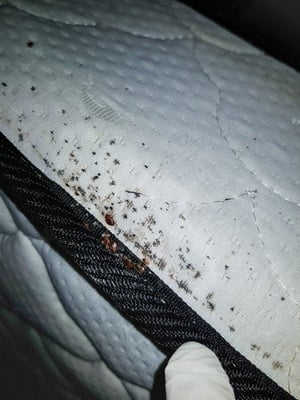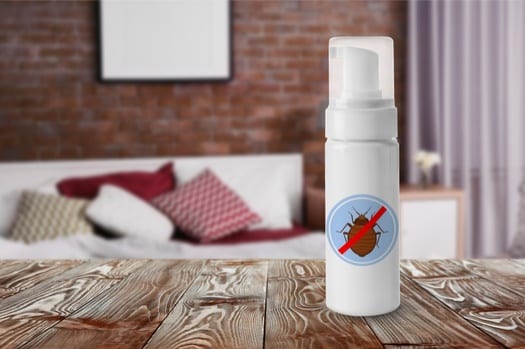Getting rid of bed bugs in your mattress can be a nightmare. If you haven’t got the cash to hire an exterminator, though, don’t worry. There are ways to kill bed bugs where you don’t have to pay an exterminator. One of those options is to use sprays, made from one of a variety of insecticides.
Basic insecticides can be sprayed on mattresses. You can also use essential oil sprays, or Aprehend, which contains an insecticidal fungus. Testing shows that commercially available essential oil sprays like EcoRaider are just as effective as pyrethrin-based insecticides.
There are advantages and disadvantages to every bed bug mattress spray, which we’ve detailed in more depth in this in-depth guide. So, to find out what kind of spray to use (and why), read on!
What Spray is Good for Bed Bugs in Mattresses?
Don’t sleep anywhere other than your bed. That might sound like terrible advice, because you’re going to keep getting bitten, but it’s not.
By moving anywhere else in the house, you increase the chance of the bed bugs spreading, either to the sofa or to another bed. Just about anything can become infested, including memory foam mattresses. Bed bugs are just looking for a dark place to hide.
You need to make your own bed ‘safe’ before anything else. One of the best ways to do that is with sprays. But what bed bug spray for mattresses should you use?
Commercial Bed Bug Sprays
There are sprays specifically intended to kill bed bugs in the home. Some of these are based on natural ingredients, i.e., bioinsecticides, like Aprehend.
Aprehend is a spray that contains a natural fungal disease of insects called Beauveria bassiana, which only affects pests like bed bugs. It also contains oils that help the fungus stick to the bed bugs.
Others are synthetic. These include sprays like Bedlam Plus, FenvaStar EcoCap, and Bayer Advanced. Whatever’s in them, you take them and spray them in the same way you would any other aerosol can directly on the bed bugs if possible. If you can’t, then just at areas where the bed bugs have to travel through is a good alternative.
These sprays are designed to linger, too. Permethrin sprays like Formula P can remain where you sprayed them for up to six weeks, if not longer, and will continue to have an effect over this time.
That means that they can both kill and repel bed bugs for an extended period. Aprehend will keep working for a while, too, as the spores remain inactive until they come into contact with a bed bug.
- Pros: They are thoroughly tested before they come on to the market. They’re guaranteed to be safe for immediate use, provided that you follow the instructions on the label.
- Cons: Synthetic bed bug sprays smell quite bad. Pesticides and insecticides typically do, because they’re made from unique synthetic chemicals that we would recognize as bitter because we’re not supposed to eat them. Not only that, but permethrins and pyrethroids are toxic to animals, especially cats. You shouldn’t use sprays that contain either if you have pets.
Tea Tree Oil Spray for Bed Bugs in Mattresses
Tea tree oil is one of the best-known home remedies for bed bugs. It’s reasonably effective, although it won’t get rid of your bed bug infestation all on its own. It makes a great start to tackling your bed bug infestation, though.
Why does tea tree oil kill bed bugs? Because it produces a natural reaction almost like an allergic reaction in most animals. If you were to ingest enough tea tree oil, for example, you would start vomiting violently and could even die.
And if you were to apply bottle after bottle of tea tree oil to your skin, neat, you would be in incredible pain. It’s that same reaction that kills bed bugs.
You can either buy a tea tree oil based spray, or make your own at home. To make your own, we recommend a 5% concentration mix. Mix the tea tree oil with regular water.
To encourage the two to mix, you can use a little bit of dish soap (the point of soap is that it helps greasy fats and oils mix with water). This doesn’t reduce how effective the spray is. Then, you can use it like you would any other bed bug spray.
- Pros: You can make tea tree oil sprays at home. This has a couple of advantages. First, it means they’re easy to source, no matter where you live. Not only that, but you know exactly what goes into them. Nothing synthetic, just natural ingredients.
- Cons: Your homemade spray isn’t likely to be as effective as something tested and marketed as a commercial spray. You’re also more likely to experience inconsistent results, e.g., by mistakenly putting too much or too little tea tree oil in the spray.
Other Essential Oil Sprays for Bed Bugs
Tea tree oil isn’t the only thing that works to kill bed bugs. Other essential oils like rose oil, palmarosa oil, and citronella oil contain a substance called geraniol. Geraniol is one of the active ingredients in EcoRaider, a bed bug spray made from essential oils. It also contains cedar oil.
These sprays work the same way that tea tree oil does. As you will know if you’ve ever used essential oils, you’re supposed to dilute them before you put them on your skin.
That’s because they can cause a reaction, turning your skin red and causing a stinging sensation. Multiply that by a thousand and that could be a serious health risk, which is why bed bugs are affected by oils in this way.

A paper in Insects studied EcoRaider to see if it was as effective as other treatments. It was compared to a pyrethroid spray, pyrethroids being the family of chemicals that permethrin belongs to.
The scientists selected test apartments in New Jersey, spread across two high-rise blocks. They identified the infested apartments, of which there were 24 selected for the study. These apartments were divided into three, since there were three sprays to test.
The team then sprayed each apartment just once, and followed up with biweekly visits afterward to see how well the sprays worked. They found that after 12 weeks, each spray performed almost the same, at just over a 90% kill rate.
EcoRaider was just a little bit worse than the pyrethroid spray, at 92.5% efficacy compared to 92.9%. The two sprays applied together were actually worse, at 91.7%.
- Pros: These sprays are all natural, and have been tested. We know that they’re effective, and yet they don’t smell bad like synthetic sprays do. Overall, these sprays have all the benefits of synthetic sprays with fewer drawbacks.
- Cons: The only problem is that sprays, generally, aren’t 100% effective. That’s because bed bugs scatter when you try and spray them. Unfortunately, that applies to these sprays just as it does any other spray.
DIY Bed Bug Sprays
There are all sorts of DIY bed bug sprays that blogs and magazines claim work. However, their suggestions aren’t always backed up by science. These include:
- Rubbing alcohol, which kills bed bugs on contact.
- White vinegar, which is supposed to kill bed bugs, but has no scientific backing.
- Apple cider vinegar, which is suggested for just about everything these days.
- Suggestions for sprays made with random essential oils, rather than those backed by studies.
- Other DIY treatments are based on heat, like using a hot iron or a hairdryer. Neither of these methods reaches the required temperature to kill bed bugs (at least in the amount of time that you can apply the heat for).
- Others are homemade traps, like double-sided tape. A bed bug would stick to double-sided tape if you pushed them down onto it, but in reality, they’ll avoid walking on it.
Aside from the question of whether they work or not, there are also many reasons why these ideas aren’t good ones. Rubbing alcohol, for example, can kill bed bugs. But if you use it consistently, it will build up and become a serious fire hazard.
Bed Bug Spray vs. Bed Bug Bomb
Bed bug bombs are like a take-home version of the spray that an exterminator uses. They contain a small amount of a chemical called permethrin, usually at a concentration of just 0.5%.
However, that’s more than enough to kill any bed bug that comes into contact with it. You don’t even have to spray them yourself. You start the spray, and it sits, spraying, in the middle of the room for you.
However, bed bug bombs aren’t a good choice for killing bed bugs in mattresses. That’s because bed bugs are experts at hiding.
Flip over your mattress right now, and it’s likely that there are some there. But they’re not just crawling around. They’re burrowed as deep as they can get into the piping around the edge of the mattress, or under buttons.
Why does that matter? Because it means that the spray physically can’t reach them. Of course, they’ll die when they come out. Permethrin sprays can linger for weeks, and still be killing bed bugs whenever they come out. But even so, there are better choices for killing bed bugs in mattresses.
- Pros: Bed bug bombs do contain insecticides that genuinely kill bed bugs. They’re also easy to use, since you set them to start spraying, and then leave them be for at least a few hours. Like other permethrin sprays, the permethrin actually lingers on surfaces for several weeks, which means that they also effectively repel bed bugs for an extended period of time.
- Cons: Bed bug sprays can’t reach cracks and hidden places, which means they’re ineffective at killing entire infestations. Again, permethrin and pyrethroids are toxic to pets, so don’t use bed bug bombs especially if you have cats.
Do Bed Bug Powders Work on Mattresses?
There are many powders that are supposed to have the same effect as sprays, which you use in almost the same way. Instead of spraying a liquid, you shake a little bit of powder. These include powders that are based on the same kinds of insecticides (e.g., permethrin) that are in sprays.
However, you can also purchase diatomaceous earth for bed bugs. This is a kind of finely pulverized rock, that feels soft to the touch. On a microscopic level, it’s anything but soft.
The tiny individual grains of rock left behind after it’s crushed are jagged and sharp. When a bed bug scuttles through some diatomaceous earth, it scratches and destroys the outer layer of the shell.

No doubt you’re wondering why that’s so important. Well, that outer layer is what stops them from dehydrating. Bed bugs don’t drink, and only feed infrequently, so need to hold onto all the moisture they can. But without that outer layer, it all evaporates. Once they dehydrate, they die.
- Pros: Diatomaceous earth has no odor, unlike almost every spray you can buy. It’s also completely non-toxic, either to you or to your pets. And because of the way it works, bed bugs haven’t become immune to it yet as is the case with common pesticides.
- Cons: You can’t apply it as a spray, only as a powder. As such, it’s a little more challenging to use than a spray. It’s also not as effective as pesticides are at killing bed bugs on mattresses. And leaving little piles of powder everywhere can be an eyesore, especially compared to a spray, which you can’t see once you’ve sprayed it.
Is Bed Bug Spray Toxic?
Several bed bug sprays are toxic, yes. Bed bug bombs are an excellent example. The chemicals they contain (permethrins, pyrethrins, and pyrethroids) are toxic to life.
In the small concentrations, you get in a bed bug bomb, you’d need to breathe in quite a lot to do yourself harm. However, it’s possible to do so, and there are many accidents each year that involve them.
The same doesn’t apply to biopesticides like Aprehend or essential oil sprays. These sprays are specially formulated from active ingredients that aren’t harmful to people. And if you’re making your own at home, follow a well-known recipe as described to avoid the potential for it to be harmful.
Always follow the instructions that are listed on the label. Whether you’re using a bed bug bomb or a spray, it will tell you what concentration of pesticide to use, for example, or where exactly you should and shouldn’t spray it.
Follow these guidelines to the letter, especially any that require you to wear rubber gloves and to avoid contact with skin or eyes.
Bed Bug Spray and Pets
Permethrin and pyrethroids are highly toxic to certain animals. It all comes down to how well an animal can metabolize the chemicals in the spray. People can metabolize them quite well.
Hardly any is absorbed through our skin, and any that is, is then sent to the liver and rendered harmless. However, some animals can’t do that as well as we can. Animals that struggle to metabolize permethrin or pyrethroids include:
- Insects (obviously)
- Fish and other aquatic animals
- Snakes
- Cats
The fact that permethrin is dangerous for many animals is reflected by the EPA (Environmental Protection Agency). They have designated permethrin a restricted use substance, which means that it can only be used or disposed of in certain settings.
It’s also a stable chemical, which means that it can remain in soil or on surfaces for many months before degrading.
According to the Australian Veterinary Journal, permethrin poisoning usually occurs in cats by mistake. Since permethrin is an ingredient in many dog flea treatments, cats that are accidentally treated with it can die.
Even cats that just come into contact with a dog that’s had a permethrin treatment can cause them serious harm. Cats exposed to permethrin become hyperactive, and in the worst case will start to tremble, experience seizures, and pass away.
Which Bed Bug Spray is Most Effective?
No doubt you’ve tried your fair share of useless DIY tips and supposedly-helpful products. Everyone who’s dealt with bed bugs can say the same. So, of all the sprays listed above, which is the most effective? And which should you avoid?
Best Spray for Bed Bugs on Mattresses
Of the commercially available sprays, we would recommend Aprehend. The idea of using an insecticidal fungus to control bed bugs is completely novel, and sidesteps the problem of bed bugs becoming immune to synthetic pesticides. It can also work for three months after application, since the spores remain inactive until they come into contact with a bed bug.
Not only that, but the fact that it’s a fungal infection means that the infection can spread. If one bed bug were to come into contact with a synthetic insecticide—well, they would die. But if they came into contact with Aprehend, they could pass the infection on to the other bed bugs. That makes their spray especially effective.

The idea of using a fungal insecticide is an odd one, but if you’re picturing mushrooms or big patches of mold on the underside of your mattress, don’t.
The spores can only grow on bed bugs, not on anything else. If you spray it on fabric, for example, the spores will be completely inactive until they come into contact with a bed bug.
Don’t bother using bed bug bombs for mattresses. As we said, they’re ineffective. They also necessitate you leaving the room or even your whole house for several hours while the spray works.
And concerning bed bug spray and pets, permethrins can actually prove fatal for cats and other small animals. As such, we recommend not using them.
Does Bed Bug Spray Kill Eggs?
Bed bug sprays kill on contact. They can’t kill through ingestion (like many cockroach sprays and powders) because bed bugs only feed on blood. As such, the only way to kill a bed bug is either if they breathe something in, or they come into contact with it.
Because bed bug eggs don’t breathe (at least not in the same way), that’s one potential way of killing them ruled out. However, it is possible for sprays to kill them on contact. But there’s one big problem. Bed bug eggs are difficult to spray, because they’re almost always hard to reach.
Bed bugs take care to lay their eggs somewhere that’s hidden. That might be in a tiny crack underneath some furniture, for example, or in the actual bed frame rather than the mattress. They lay them here so that nothing can reach them, either to eat them or to kill them.
How to Use a Spray to Kill Bed Bugs on Mattresses
When you use a spray to kill bed bugs, you have to apply it directly to them. This is easier said than done because they’ll do anything they can to avoid you or get away from you. So, how can you effectively kill them with a spray? Here’s how.
- Get prepared. Purchase or make your spray, and have it ready with you. Tidy the room before you begin by picking up anything off the floor, and bagging all of your clothes in preparation to wash them. Seal the bags and leave them outside for the time being.
- Get started by flipping the mattress. Start spraying immediately, taking care to hit any bed bug that’s scurrying away. Pay special attention to the piping of the mattress, spraying it all the way around to kill any bed bugs or their eggs hiding there.
- Wipe down the main area of infestation with a damp cloth, and bag it before you leave the room. Wiping the area down will get rid of any lingering smell. If you didn’t know, bed bugs find their home by searching out its smell.
- Repeat this process with nearby furniture, or anywhere else they might be hiding (bar electrical outlets, since it’s best not to spray those.)
- Once you’re done, wash the clothes that you bagged. Put the bag itself into the washing machine before you open it, and dump the clothes directly inside. Wash for at least half an hour at a high temperature to guarantee that you kill both the bed bugs and their eggs.
It’s important to repeat this entire process, too. Sprays like these will not be able to kill all bed bugs in just one pass. You have to keep at it, and basically, make their lives hell.
As the study on EcoRaider above shows, bed bugs will remain for at least 12 weeks after just one spray. So, perhaps after six weeks, you could spray again to hasten the process.
Where Can You Use Bed Bug Sprays?
Bed bug sprays don’t just work on mattresses. You can use them all around the home, or on your belongings too. If you do plan on spraying some of your belongings, like your clothes, then it’s important to use a spray that is non-toxic and won’t have any side effects.
If you do use that kind of spray, you could spray your bedclothes to repel bed bugs at night. Or, you could spray your work clothes and bag, so you don’t pick any up.
You can also use them on furniture. The way you would use them is the same. Just make sure that you have a spray which settles and lasts for a long time, so that you can repel bed bugs as well as kill them. The same applies if you’re spraying elsewhere, like on the carpet.
One great use of sprays is when you travel. Hotels and hostels are notorious for bed bugs these days, and they’re a prime location to pick up an infestation if you don’t have one already. As such, you can spray your belongings and clothes before you travel.
You could even spray the bed you’re about to sleep in. But again, if you’re going to do that, use a natural spray rather than one that contains insecticides. It’s safer for your health.
What to Do If Sprays Don’t Kill Bed Bugs
If your spray doesn’t kill your bed bugs straight away, don’t worry. Most sprays take several weeks to have a full effect. The study discussed above, for example, that looked at the effectiveness of EcoRaider took 12 weeks to kill 90% of the bed bugs.
But in the intervening time—after 4 weeks, for example—there was almost exactly 50% of the original infestation left.
But if the spray doesn’t seem to have had an effect, you do have other options. If you want to be sure that there aren’t any bed bugs left, you could pay for heat treatment. This is an expensive way to kill bed bugs, admittedly, but it’s currently the best method we have.
Heat treatment requires a pest control professional. It requires expensive equipment that can heat a room, apartment, or even an entire home to 120 degrees or higher for six hours, if not longer.
Bed bugs will die instantly in temperatures higher than 122 degrees. But to get them to that temperature, you need to heat a room for several hours, so that the inside of furniture and mattresses can get hot too.


Lou –
For bed bug trap with yeast: How much yeast to how much sugar to how much water?? Thank you very much for your knowledge.